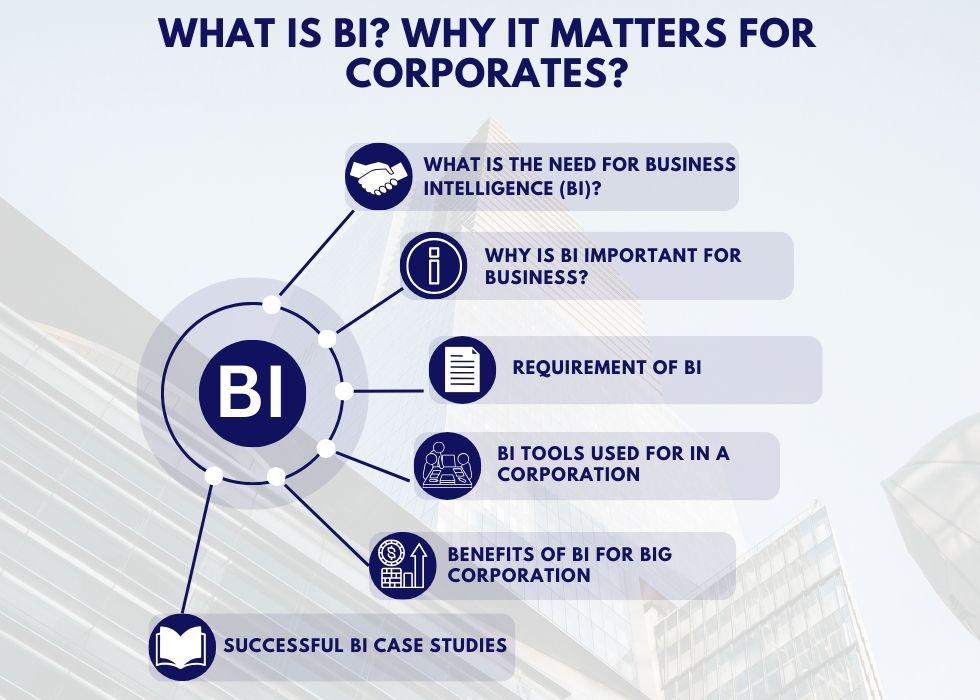Business Intelligence (BI) is the strategic utilization of cutting-edge technology and data analysis tools to convert raw data into actionable insights, facilitating informed decision-making in the business realm. This process involves collecting, processing, and visualizing data from diverse sources, thereby unveiling significant trends, patterns, and invaluable information. BI equips organizations with the tools to effectively monitor performance, track essential metrics, and attain a competitive advantage by making decisions based on data. This pivotal approach plays a crucial role in optimizing operational efficiency, enhancing overall productivity, and uncovering growth opportunities. BI tools encompass an array of resources, including intuitive dashboards, detailed reports, and sophisticated data mining capabilities, all aimed at offering organizations a clear and comprehensive perspective of their data, enabling more strategic planning.
For corporations, Business Intelligence (BI) is an indispensable asset that bestows the capability to make well-informed decisions through data-driven insights. By harnessing the power of data, BI not only reveals vital insights but also identifies emerging trends and assesses performance, fundamentally supporting strategic planning and resource allocation. With BI, corporations experience enhanced operational efficiency, streamlined processes, and real-time monitoring of key performance indicators (KPIs), which results in cost savings and a bolstered competitive position. Furthermore, BI enables swift adaptability to market changes, facilitating agility and the seizing of new opportunities. In today's data-driven landscape, BI is not merely advantageous; it's an imperative tool for corporations, ensuring they remain competitive, agile, and future-ready in a fast-paced business environment.
What is the need for Business Intelligence (BI)?
Business Intelligence (BI) is not just a choice but a strategic imperative for contemporary businesses. It acts as a guiding light in the vast expanse of data, converting raw information into actionable insights that fuel informed decision-making. BI is the cornerstone of competitiveness and adaptability in a rapidly evolving market landscape. It not only streamlines operations, identifies avenues for growth, and facilitates performance monitoring but also empowers businesses to harness the full potential of their data. In the age of data ubiquity, BI is the compass that provides clarity and strategic direction. It optimizes processes, supports agile decision-making, and is, indeed, a requisite for survival and success in our increasingly data-centric corporate world. Business Intelligence: more than an advantage, it's a necessity.
Why is BI important for Business?
In today's data-driven business landscape, Business Intelligence (BI) stands as a beacon of paramount importance, guiding companies toward strategic decisions and bolstering their growth and competitive standing. BI's significance becomes clear when we consider its multifaceted benefits:
BI furnishes companies with access to comprehensive real-time data, enabling them to make informed, data-driven decisions. This empowers them to forge more effective strategies and allocate resources with precision.
BI equips businesses with valuable insights into market trends, customer behavior, and the performance of competitors. This knowledge is the key to staying ahead of the competition and responding nimbly to market changes.
By automating data analysis and reporting, BI optimizes operations, reducing manual effort and enhancing overall efficiency. It adeptly identifies operational bottlenecks, providing the roadmap for process optimization.
Understanding and catering to customer preferences and behavior is paramount in today's business landscape. BI tools excel at profiling customers, personalizing marketing endeavors, and ultimately improving customer satisfaction.
Understanding and catering to customer preferences and behavior is paramount in today's business landscape. BI tools excel at profiling customers, personalizing marketing endeavors, and ultimately improving customer satisfaction.
BI diligently identifies areas for cost reduction and resource optimization, culminating in heightened profitability and sustainability.
In essence, BI serves as the driving force behind businesses' ability to unlock the full potential of their data, effectively transforming it into a strategic asset that fuels growth, fosters innovation, and ensures resilience in our increasingly complex and fiercely competitive business environment.
What is Requirement of BI?
The need for Business Intelligence (BI) stems from the imperative of data-driven decision-making in today's corporate landscape. BI tools and systems are indispensable for aggregating, analyzing, and visually representing data from diverse sources, empowering organizations to glean insights, monitor performance, and identify trends. This timely access to information equips them for well-informed decision-making, providing a competitive edge in an era awash with data.
BI serves as a vital catalyst:
Enhancing Efficiency
BI streamlines processes, identifies bottlenecks, and reduces operational costs for businesses seeking improved productivity.
Comprehending Customer Behavior
BI tools enable businesses to gain a comprehensive understanding of customer behavior, preferences, and feedback, leading to enhanced customer satisfaction and personalized marketing.
Optimizing Operations
Uncover the role of BI in helping companies streamline their operations, cut costs, and boost overall efficiency to achieve competitive advantages.
Strategizing for the Future
BI supports businesses in making long-term plans, adapting to market changes, and identifying growth opportunities, ensuring they remain agile and forward focused.
It acts as the bridge that transforms raw data into actionable intelligence, thereby serving as a foundational element for success and expansion in today's intricate and data-rich business environment.
In essence, Business Intelligence is the cornerstone of the modern business landscape, offering the means to navigate the complex data terrain, make astute decisions, and remain competitive in an ever-evolving corporate world.
What are business intelligence tools used for in a corporation?
Business Intelligence (BI) tools are the unsung heroes of corporate operations, playing a pivotal role in optimizing business activities. Their applications are diverse and encompass a multitude of critical functions:

1. Data Collection and Integration:
BI tools adeptly consolidate data from a plethora of sources, creating a unified data management platform that serves as the backbone of an organization's data strategy.

2. Data Analysis:
Leveraging cutting-edge analytics methods such as data mining, statistical analysis, and machine learning, these tools unveil invaluable insights from vast datasets.

3. Reporting and Visualization:
BI tools simplify complex data interpretation by generating interactive reports, user-friendly dashboards, and visually engaging representations, making data more accessible and actionable.

4. Performance Monitoring:
They facilitate real-time tracking of key performance indicators (KPIs) and are equipped to issue alerts, ensuring prompt and informed decision-making.

5. Forecasting and Predictive Analysis:
BI tools use historical data to make predictions, providing vital support for long-term planning and adaptation to evolving market dynamics.

6. Competitive Analysis:
Businesses leverage BI tools to stay ahead in the competitive landscape by assessing market trends, competitor performance, and other benchmarking opportunities.

7. Operational Efficiency:
BI is the detective that uncovers operational bottlenecks and provides the roadmap for resource allocation and process optimization.

8. Customer Insights:
BI tools are the enablers of enhanced customer relationships, offering a comprehensive understanding of customer behavior, preferences, and feedback for personalized marketing and improved service.

9. Compliance and Risk Management:
By promoting transparent data reporting and audit trails, BI tools support regulatory compliance and robust risk assessment.
In essence, BI tools are the driving force behind corporate growth, fostering intelligent decision-making, operational efficiency, and overall business expansion. They form an integral part of modern business strategies, ensuring adaptability in an increasingly data-centric world.
What are the benefits of Business Intelligence for big corporation?
Business Intelligence (BI) holds a pivotal role in the operations of large corporations, offering an array of advantages that elevate their strategic decision-making and overall efficiency. Let's delve deeper into why BI is considered indispensable in the realm of big business:
- Informed Decision-Making: BI equips corporations with a comprehensive understanding of their data, facilitating well-informed choices. For instance, retail giants employ BI to analyze sales trends and optimize inventory, enhancing their competitiveness.
- Operational Efficiency: Through the application of BI, large corporations can streamline their processes, leading to cost reduction and heightened productivity. Airlines, for instance, employ BI to optimize flight schedules and crew assignments, ensuring smoother operations.
- Customer Insights: BI delves into customer behavior, preferences, and feedback, enabling personalized marketing strategies. Amazon is a prime example, utilizing BI to provide tailored product recommendations, enhancing customer satisfaction.
- Competitive Advantage: With BI, corporations gain a competitive edge. Netflix, for example, leverages BI to recommend content, giving them an edge in the highly competitive streaming industry.
- Risk Management: BI assists in the identification and mitigation of risks. Large financial institutions use BI to monitor transactions and detect fraudulent activities, ensuring financial security.
- Strategic Planning: BI supports long-term planning and adaptability to market changes. Tesla is a prime illustration, using BI for supply chain optimization and strategic decision-making.
- Real-Time Monitoring: BI offers real-time performance monitoring, enabling corporations to swiftly respond to changes. This is particularly evident in the manufacturing sector, with companies like General Electric utilizing BI to maintain operational excellence.
- Regulatory Compliance: In industries like healthcare, where patient data is handled with utmost care, BI tools play a crucial role in ensuring regulatory compliance and data security.
In conclusion, BI is a formidable asset for large corporations, enhancing competitiveness, operational efficiency, and adaptability. It fosters intelligent decision-making, offers insights into customer behavior, and drives innovation, establishing itself as an indispensable component of their business strategies.
Read More About BI
Frequently Asked Questions? (FAQs)
Uncover the diverse applications of BI tools, from data collection and analysis to reporting and visualization, and understand how they support key business activities.
Explore the various BI tools and software that corporations use to collect, analyze, and visualize data, providing a comprehensive view for strategic decision-making.
Explore how BI tools provide deep insights into customer behavior, preferences, and feedback, enabling personalized marketing and improved customer satisfaction.
Delve into the fundamental requirements that make BI an indispensable tool for businesses navigating the complexities of a data-rich environment.
Explore the significance of BI in driving informed decision-making, improving operational efficiency, and maintaining a competitive edge.
